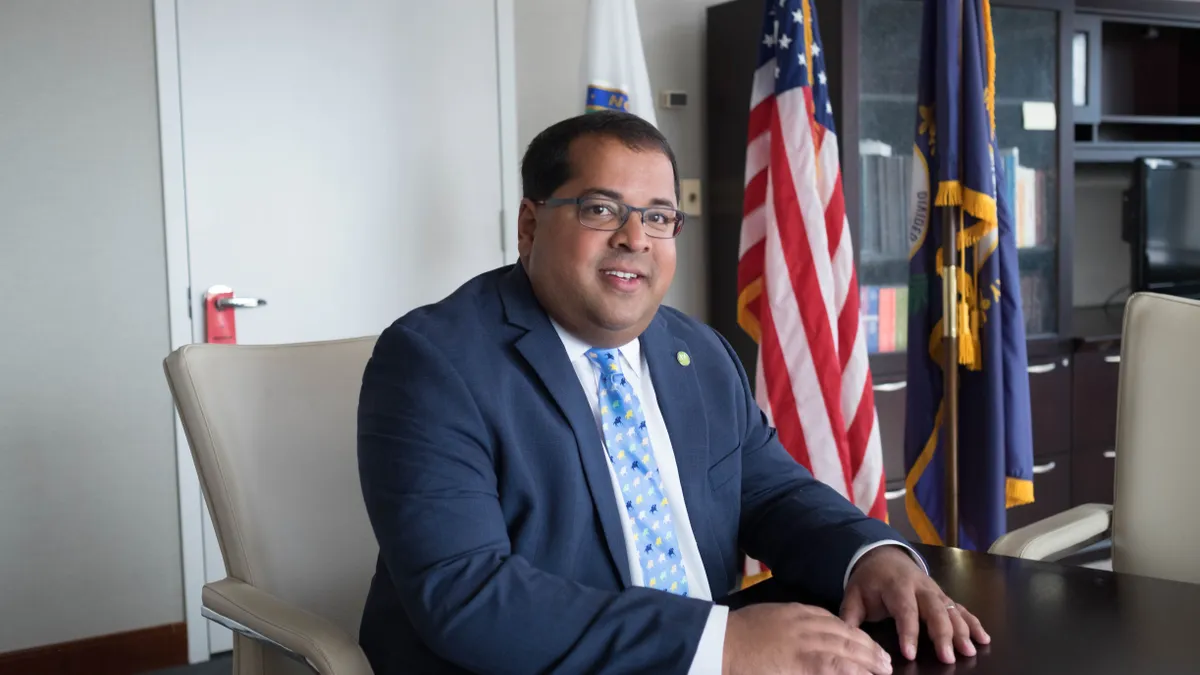Dive Brief:
-
Federal Energy Regulatory Commissioner Neil Chatterjee would like to see issues around grid reliability and resilience become less partisan as he prepares to exit the agency.
-
Citing rolling blackouts in California and in Texas over the past year, Chatterjee said both market and resource challenges "genuinely require examination. I was frustrated in both cases because — partially due to my own guilt of introducing politics into this serious conversation — everyone immediately viewed the circumstances through their own partisan fuel source lens," he said during a Citizens for Responsible Energy Solutions forum.
-
Commissioner Chatterjee has previously said he regrets his rhetoric around resilience early in his tenure when he was chair under the Trump Administration. Following his departure, likely before the commission's September meeting, the former chair said he hopes the commission can more thoroughly examine these issues through a nonpartisan lens.
Dive Insight:
Resiliency became a controversial topic under President Donald Trump following a proposal from the Department of Energy to bail out energy sources with onsite fuel, such as nuclear and coal, for resiliency purposes. FERC rejected the proposed rule and instead opened a docket to examine resiliency more broadly. But earlier this year the commission closed that docket, and instead opened a new proceeding to examine electric reliability in the face of climate change.
Chatterjee had voted against closing the original resiliency docket, but other commissioners largely agreed it had become too partisan to be productive.
During Wednesday's webinar, Chatterjee acknowledged that the commission "struggled" to make any real progress on resiliency during his time as chair. But he urged the commission to continue focusing on resilience and reliability through a non-partisan lens and said transmission should become the key focus when thinking about how to address those issues. FERC opened a preliminary rulemaking process to examine transmission policy in July.
"For me, that is where the commission should put the bulk of its focus [in] the coming years around this question of resilience," Chatterjee said. "We need to have the infrastructure in place to ensure that the grid of the future is there. And that is a grid that will need to be a reliable grid, and a resilient grid in the face of some of these extreme weather events."
In California last August, a heat wave triggered rolling blackouts across the state due to strained power supplies. And in Texas earlier this year, a record cold weather snap led to a demand and supply mismatch that led to millions of people without power for several days.
Conservatives were quick to blame California's rapidly evolving clean power mix and Texas' abundance of wind resources for the disasters, while progressives pointed to the failures of fossil fuel resources in Texas and called for greater deployment of storage in California. Experts on the power sector have agreed that better utilization of energy storage and demand response could help both states prevent similar disasters in the future. Better transmission planning, broader grid and resource planning, and potential market reform are all on the table as well.
Chatterjee said he worries his rhetoric that focused on potential plans to save ailing coal plants early in his tenure as chair could have fueled this partisan divide that equates resiliency issues with certain fuels. But, he is "hopeful" that some of that conflict will exit the commission when he does.
"I'm hopeful that when I depart the commission, and some of the politics that I unfortunately and unintentionally overlaid into this .... my colleagues will be able to do the serious work on the new docket that was opened in this regard because it's very important work to do."














